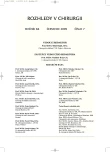Is Obesity a Real Risk Factor in Cardiosurgical Procedures?
Je obezita skutečně rizikovým faktorem u kardiochirurgických operací?
Cíl:
Obezita je obecně uváděným rizikovým faktorem při operačních výkonech včetně operací na srdci. Cílem práce bylo provést retrospektivní studii porovnávající operační výsledky kardiochirurgických operací v závislosti na body mass indexu (BMI) nemocných.
Metodika:
Do studie byli zahrnuti všichni nemocní, operovaní na našem pracovišti v letech 1998–2002. Jednalo se celkem o 4266 nemocných. Nemocní byli rozdělení do 5 skupin dle BMI. Mezi skupinami byly porovnávány předoperační, peroperační i pooperační hodnoty.
Výsledky:
V předoperačních ani peroperačních datech se skupiny významně nelišily. Pooperační výsledky byly bez statisticky významného rozdílu mezi jednotlivými skupinami s naznačeným trendem k lepším výsledkům u skupin s vyšším BMI. Naopak u skupiny s BMI pod 20 kg/m2 byly výsledky nejhorší, avšak rovněž bez statistické významnosti.
Závěr:
Provedená retrospektivní studie neprokázala obezitu jako rizikový faktor při operačních výkonech na srdci, naopak naznačila jako rizikový faktor BMI pod 20 kg/m2.
Klíčová slova:
obezita – nadváha – body mass index – operace – srdce
Authors:
R. Brát; M. Kolek
Authors‘ workplace:
Kardiochirurgické centrum FNsP Ostrava, primář MUDr. R. Brát, Ph. D.
Published in:
Rozhl. Chir., 2005, roč. 84, č. 7, s. 342-345.
Category:
Monothematic special - Original
Overview
Aim:
Obesity is generally presented to be a risk factor in surgical procedures including the cardiac ones. The aim of this work was to conduct a retrospective study comparing surgical results of the cardiosurgical procedures depending on each patient‘ s body mass index data (BMI).
Methodology:
All 4266 patients operated by our team during 1998–2002 have been included in the study. The patient subjects were allocated in 5 groups according to their individual BMIs. Preoperative, peroperative and postoperative data of all groups were compared.
Results:
There were no significant differences in the preoperative and peroperative data between the groups. The postoperative results showed no statistical differences between the individual groups, indicating a trend towards better results in the groups with higher BMIs. On the contrary, the results of the group with the BMI of less than 20 kg/m2 were the worst, however they were also of no statistical significance.
Conclusion:
The restrospective study did not prove the obesity to be a risk factor in cardiosurgical procedures. On the contrary, it suggested the BMI of less than 20 kg/m2 to be a risk factor.
Key words:
obesity – overweight – body mass index – surgery – heart
Labels
Surgery Orthopaedics Trauma surgeryArticle was published in
Perspectives in Surgery

2005 Issue 7
- Possibilities of Using Metamizole in the Treatment of Acute Primary Headaches
- Metamizole vs. Tramadol in Postoperative Analgesia
- Spasmolytic Effect of Metamizole
- Metamizole at a Glance and in Practice – Effective Non-Opioid Analgesic for All Ages
-
All articles in this issue
- Resection of the Trachea with Extracorporeal Circulation as a Simultaneous Procedure during Coronary Artery Bypass Grafting – A Case Report
- Is Obesity a Real Risk Factor in Cardiosurgical Procedures?
- A Postoperative Bronchopleural Fistule – A Success of the Conservative Treatment (a Case Review)
- Allografts in the Vascular Surgery
- Pathophysiology of Postoperative Dysfunctions of the Intestinal Motility. A Review
- An Unusual Cause of the Chronic Ileus State – The Absence of the Intestinal Wall Muscularis Layer
- Small Bowel Carcinoid
- Amoebic Liver Abscess – Case Report
- A Spinal Cord Injury Caused by a Migrating Kirschner Wire Following Osteosynthesis of the Clavicle: A Case Review
- Perspectives in Surgery
- Journal archive
- Current issue
- About the journal
Most read in this issue
- Pathophysiology of Postoperative Dysfunctions of the Intestinal Motility. A Review
- Small Bowel Carcinoid
- A Postoperative Bronchopleural Fistule – A Success of the Conservative Treatment (a Case Review)
- Amoebic Liver Abscess – Case Report
